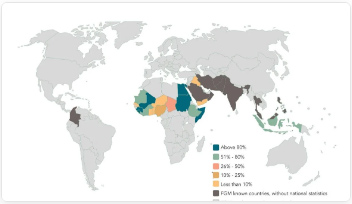
A tool to estimate the current and projected financial health care costs associated with FGM in specific countries, as well as the potential cost savings to health systems of reducing new cases of FGM.
Female Genital Mutilation
Female Genital Mutilation (FGM) has no medical justification and no health benefits. Rather, it increases the risks of physical, mental and sexual health complications, both in the short-term and in the long-term. It involves removing and injuring healthy and normal female genital tissue, interfering with the natural functions of girls' and women's bodies. It is a harmful practice and is unacceptable from a human rights and public health perspective.
WHO is opposed to all forms of FGM.
HRP supports WHO in its public health approach to FGM. WHO works to ensure that girls and women living with FGM receive quality medical care and counselling, while also generating and compiling evidence to inform programmes and policies for the health sector and beyond, as well as developing advocacy tools to support efforts to prevent FGM. Efforts include:

A tool to estimate the current and projected financial health care costs associated with FGM in specific countries, as well as the potential cost savings to health systems of reducing new cases of FGM.
In 2016, the World Health Organization (WHO) published the WHO guidelines on the management of health complications from female genital mutilation. That...
This guide is intended to promote a global health sector response to FGM for the provision of high-quality prevention and care services to women and girls...
Evidence shows that FGM can cause several physical, mental and sexual health complications in girls and women, and in newborns. Health-care providers...